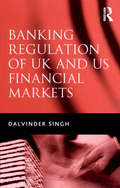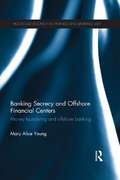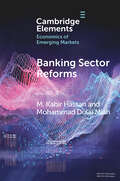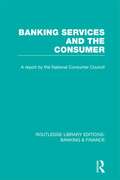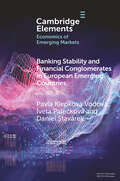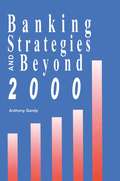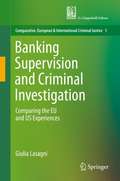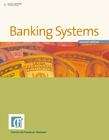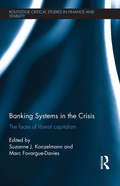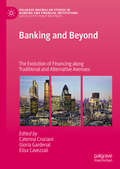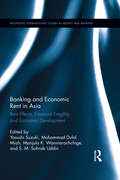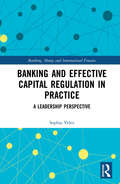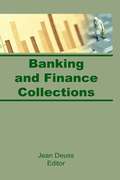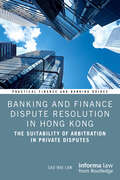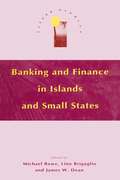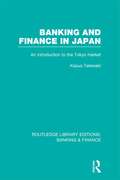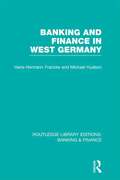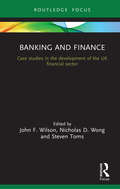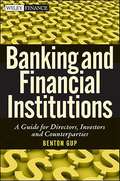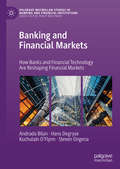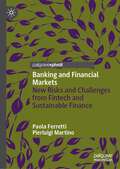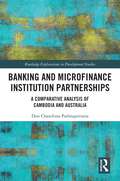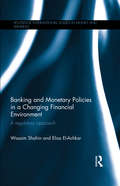- Table View
- List View
Banking Regulation of UK and US Financial Markets
by Dalvinder SinghDalvinder Singh provides an interdisciplinary analysis of the legal aspects of prudential supervision. This gives the reader a broader understanding of the core processes of banking supervision. By using the UK as a case study, a comparison is made with the US to illustrate the different ways of approaching the issues. The author examines the legal as well as the theoretical, economic, political and policy issues that underpin the purpose of prudential supervision, such as corporate governance, enforcement sanctions, the role of external auditors and accountability of financial regulators. These are considered in the context of broad-policy considerations which render prudential supervision necessary, namely financial stability and depositor protection. The book will be of interest to academics, policymakers, regulators and practitioners, and equally will serve specialist undergraduate and postgraduate programmes in law, management and economics which focus on financial regulation.
Banking Secrecy and Global Finance: Economic And Political Issues
by Donato Masciandaro Olga BalakinaA 2009 G20 official document stated that the era of banking secrecy is over but is it? If banking secrecy is the result of market mechanisms, it suggests that worldwide demand and supply are likely to remain for a long time to come. Since the Global Financial Crisis, many countries have fought to combat banking secrecy, yet it permeates both national and international industries, and global efforts to prevent banking secrecy have been ineffective or at worst counterproductive. In this book, the authors show how the growth of criminal activity has systematically generated a demand for banking secrecy. They explore how national politicians and international banks have been motivated to supply banking secrecy through economic and political incentives, and shed light on the economics and politics of banking secrecy. This book takes a multidisciplinary approach to reveal the variety of behaviours and processes involved in making dirty money appear clean, providing an in-depth study of financial transactions which are characterized by a special purpose: hiding the originally illegal sources. This work will be of interest to students and scholars of economics and finance, and those with an interest in banking secrecy, global finance, international banking, and financial regulation.
Banking Secrecy and Offshore Financial Centers: Money laundering and offshore banking (Routledge Research in Finance and Banking Law)
by Mary Alice YoungThis book brings together the issues surrounding banking secrecy and confiscation of criminal proceeds. The book examines the existing legal agreements at the international, regional and national levels and their interaction in the substantive areas of confiscation, anti-money laundering and banking confidentiality laws. It looks at how these agreements have been applied in offshore financial centers and demonstrates that despite a number of legally binding UN Conventions as well as global anti-money laundering recommendations, the implementation of them is often lukewarm by those Parties who have ratified the Convention and adopted obligations, because of this the confiscation legislation is incompatible with strict banking confidentiality laws. The work draws on the experience of criminologists to offer critical insight into the legislative frameworks designed to deal with banking secrecy and confiscation in offshore financial centers. It goes on to offer suggestions for measures that may be taken by major economies to circumvent the lack of cooperation by offshore financial centers as intolerance towards money laundering grows in light of recent political and economic events. This book will be of particular interest to students and scholars of Law, Finance and Criminology.
Banking Sector Reforms: Is China Following Japan's Footstep? (Elements in the Economics of Emerging Markets)
by M. Kabir Hassan Mohammad Dulal MiahChina registered double-digit GDP growth for more than three decades. Recently, the rate has slowed down considerably. The slow growth period, which Chinese policymakers refer to as the 'new-normal', has created enormous curiosity among scholars and policymakers. In particular, scholars often tend to project if China is destined to follow Japan's fate. Insufficient reforms in the banking sector in commensuration with the real economy in Japan resulted in an unprecedented financial catastrophe. Similarly, an asymmetric development between the Chinese banking sector and the real economy is observed. This leads to an interesting question: is China destined to meet Japan's legacy? This Element attempts to answer this question. In so doing, it delves deep into the banking sector reforms of China. The Element concludes that China is not on course to meet an immediate financial chaos, but the country needs further banking reforms to avoid a potential crisis.
Banking Services and the Consumer: Banking And Finance) (Routledge Library Editions: Banking & Finance)
by Consumer FocusThis report, prepared for the government by the National Consumer Council, examines money transmission, access to banking services, new technology, banking and the law, disputes between bank and customer, saving and borrowing. There are special sections on Northern Ireland and Scotland and on bank executor and trustee work – all from a consumer perspective. It is based on the findings of two surveys of consumer attitudes to banking services and evidence from the banks and building societies themselves.
Banking Soundness and Monetary Policy
by Charles Enoch John H. GreenA report from the International Monetary Fund.
Banking Stability and Financial Conglomerates in European Emerging Countries (Elements in the Economics of Emerging Markets)
by Daniel Stavárek Pavla Klepková Vodová Iveta PalečkováThis Element focuses on the specific role of financial conglomerates in managing banking and financial stability. The Element aims to estimate financial stability in CEE using the constructed aggregate financial stability index, to incorporate the financial stability of the parent company into the index, and to assess the effect of the parent company on the financial stability of commercial banks and national financial sectors.
Banking Strategies Beyond 2000
by Anthony GandyFirst Published in 2000. Routledge is an imprint of Taylor & Francis, an informa company.
Banking Supervision and Criminal Investigation: Comparing the EU and US Experiences (Comparative, European and International Criminal Justice #1)
by Giulia LasagniIn the aftermath of the last financial crisis, on both sides of the Atlantic banking supervisors were given new supervisory and enforcement powers, which are often of a substantially punitive-criminal nature. In Europe in particular, the establishment of the Single Supervisory Mechanism within the European Central Bank substantially increased centralised investigatory and sanctioning powers. This major innovation, together with the development of forms of real-time monitoring of banking (often digital) records, challenges traditional banking criminal investigations in their national-based and analogue dimension.The book offers a comprehensive account and perspective analysis of the interactions between the criminal and administrative nature of such new powers, highlighting their “punitive” overall nature and their impact on fundamental rights. Covering both the US and the EU regulatory frameworks, it presents unprecedented, trans-systemic research between criminal law and procedure, and between regulatory and administrative law, at the international, European and national level.The book also includes a rich and detailed selection of case law from the US and the European supreme courts, with a specific focus on CJEU and ECtHR decisions.
Banking Systems
by Center for Financial TrainingGet started on the fast track today. BANKING SYSTEMS 2E lets you explore the principles and practices of banking and credit in the United States through learning by doing and clear explanations. Whether it's financial services, human resources, marketing, or ethics, BANKING SYSTEMS 2E makes concepts easy to understand. Success tomorrow starts today with BANKING SYSTEMS 2E.
Banking Systems in the Crisis: The Faces of Liberal Capitalism (Routledge Critical Studies in Finance and Stability)
by Suzanne J. Konzelmann Marc Fovargue-DaviesThe 2008 financial crisis has severely shaken confidence in liberal economic theory and policy. However, the sharply divergent experiences of the six Anglo-Saxon ‘liberal market economies’ (LMEs) suggest that the reality is not so simple. This book traces the evolution of liberal capitalism, from its rebirth amidst the challenges of the 1970s to its role in the genesis of the 2008 crisis – and debates the assumptions underpinning the liberal capitalist paradigm. Close examination reveals variety within liberal capitalism. Not only was there the familiar, "hands off" libertarian approach adopted by the US, UK and Ireland, but more bounded, better regulated and apparently more stable varieties of economic liberalism also emerged, through the more pragmatic approach taken by Canada, Australia and New Zealand. The evidence is compelling. Whereas the American, British and Irish financial systems were severely damaged by the crisis, those of Canada, Australia and New Zealand proved more robust. This volume explores the degree to which these divergent experiences were a result of better and more intensive supervision, differences in business or political culture, broader commitment to social norms, and the pace of liberalisation. Detailed comparative case studies reveal fundamental differences in the economic and political environments in which economic liberalisation took place, in approaches to finance and in the degree to which it was seen to be an engine for growth. The book concludes that this had a major influence on the evolving economic and financial systems, and consequently, their relative resilience when confronted with the challenges of the 2008 crisis.
Banking and Beyond: The Evolution of Financing along Traditional and Alternative Avenues (Palgrave Macmillan Studies in Banking and Financial Institutions)
by Caterina Cruciani Gloria Gardenal Elisa CavezzaliThis book explores the evolution of the banking sector and the financing tools it fosters, addressing the impact of new regulations and the ensuing opportunities for financial institutions, firms, and individuals. Written in two parts, the project includes papers presented at the 2019 Annual Conference of the Wolpertinger Club - The European Association of University Teachers in Banking and Finance. The first part addresses the impact of policy changes on banks and financial institutions, particularly the impact of recent changes in European policy. The authors explore how policy has been, and is, communicated and how it shapes new incentives and challenges for the banking sector and institutional and individual investors. The book touches upon the debate on the 'bail-in' vs 'bail-out' options and reviews new opportunities for investors on covered and subordinated bond markets in Europe, covering the new regulatory structure provided by the European authorities. The second part explores new financing tools besides the traditional banking sector available to firms and individuals, examining financing options for firms and individuals, and describing the role that alternative capital-market tools such as mini bonds and crowdfunding are playing within the landscape of SME financing. Arguing that financing decisions can ultimately affect the survival rate of startups, this edited collection will be valuable to those researching both finance and business, but particularly to those studying banking, financial institutions and entrepreneurial finance.
Banking and Economic Rent in Asia: Rent Effects, Financial Fragility, and Economic Development (Routledge International Studies in Money and Banking)
by Yasushi Suzuki Mohammad Dulal Miah Manjula K. Wanniarachchige S.M. Sohrab UddinA stable and sound financial system plays a critical role in mediating funds from surplus units to investors, making it a prerequisite for economic development. Financial intermediaries have been vulnerable to adverse changes in the local and global economy and experienced frequent bubble-and-bust episodes historically. Analyses of financial crises reveal that the incentive created by neo-liberal financial principles is inconsistent with stable financial systems, and viable solutions require structuring institutions in a way that incentives are well aligned with the fundamental principles of financial systems. By drawing on the theoretical framework of the financial restraint model, this book analyses financial sectors’ rents or bank rents and their effects on banks’ performance and stability, and presents evidence on the relationship between rent and incentive through case studies of both developed and developing countries.
Banking and Effective Capital Regulation in Practice: A Leadership Perspective (Banking, Money and International Finance)
by Sophia VelezDue to a historical lack of attention to the importance of modelling, measuring and managing risk, senior bank leaders are struggling to implement unified practices within their financial institutions that could address the gaps posed by risky management behaviour, rogue trading, liquidity crises, prohibited investments in mortgage-backed securities, and default risks aligned with loans. This book discusses the theories at play between bank agents (bank managers) and their principals (shareholders), a topic which has gained importance as a result of the banking crisis, and similarly, governed the need for more efficient risk management and ethical managerial practices. The author worked with a senior bank leadership team to identify and describe effective capital regulation practices that can lead to a reduction in loss and risky management behavioural practices. The book offers consensus on a number of activities that bank managers can implement to address bank risk. It analyses the relevant factors that determine the necessity for banking regulation and the important role of regulation in managing banking crises. The author’s analysis of the important regulatory aspects in developed countries such as the US, offers a useful conceptual framework for creating an adequate banking regulatory environment in developing countries. This book offers an original contribution to the field of banking that undergraduate, masters, PhD students, academics and researchers can use to gain a deeper understanding of the constructs at play in the banking industry.
Banking and Finance Collections
by Ash LeeA wide range of special librarians from banking, finance, and government provide descriptive accounts of their respective collections in this comprehensive volume. They provide an introduction to some of the major library and archival resources available to bankers, financiers, and investors, as well as offer access to the historian and scholar doing research in some aspect of business. The collections represented include the Federal Reserve System, the Joint Bank-Fund Library of the International Monetary Fund and the World Bank, Standard & Poor’s, the Wells Fargo Corporation, the Lippincott Library of the Wharton School, and more.
Banking and Finance Dispute Resolution in Hong Kong: The Suitability of Arbitration in Private Disputes (Practical Finance and Banking Guides)
by Sau Wai LawThis book examines the concept of ‘naming, blaming, claiming’ in the application of arbitration for private banking dispute resolution. The author focuses on examining this issue using Hong Kong as a case in point, blending theory and empirical evidence to unveil how disputes are resolved within the banking and finance industry, which will enable them to explore possible effective and efficient mechanisms to resolve financial disputes. The book offers a comprehensive review of the laws and regulations governing the private banking industry in Hong Kong and selected jurisdictions, as well as how they are implemented. It examines the clients’ perceptions through an innovative methodology for empirical studies. Describing how clients react to the laws and regulations and the potential adverse impacts to the stability of the banking industry, the author identifies possible factors that could trigger another financial crisis. Synthesising his analysis, the author proposes newly discovered self-corrective mechanisms embedded among clients and concludes with policy recommendations. Directly relevant to banking practitioners, particularly legal and compliance departments, and senior management, the book is also written for legal professionals interested in the practices of dispute resolution in banking and finance. Additional readerships will include bank regulators, government officials, policy makers, researchers, and those involved in courses in banking and financial law, as well as Arbitration and Dispute Resolution.
Banking and Finance in Islands and Small States (Island Studies)
by Lino Briguglio Michael Bowe James W. DeanThis collection of essays analyzes the special characteristics of the banking and financial sectors in islands and small states, and focuses on three main areas: the general financial environment; offshore financial centres; and banking and financial regulation. The main emphasis is on territories where banking and financial activity make a substantial contribution to gross domestic product.
Banking and Finance in Japan: An Introduction to the Tokyo Market (Routledge Library Editions: Banking & Finance)
by Kazuo TatewakiThe Tokyo market has often been a difficult financial environment for the non-Japanese to understand. This volume, written for an international readership provides a study of the financial centre behind one of the world’s largest economies.
Banking and Finance in West Germany (Routledge Library Editions: Banking & Finance)
by Michael Hudson Hans Hermann FranckeThis is a clear guide to the German financial system. It begins by outlining its historical development, emphasising the growth of close ties between the banking system and industry, and goes on to describe in details the nature of the credit institutions in general and the money and capital markets. The book emphasizes the crucial role played by the autonomy of the Bundesbank and it explains with clear illustrations the instruments available to it to conduct monetary policy. It analyses the type of monetary target adopted by the Bundesbank in the early 1970s and deals with the ‘transferability’ of the West German financial system to other countries. Wherever relevant, parallels and differences between that system and the ones operating in the US and UK are pointed out.
Banking and Finance: Case studies in the development of the UK financial sector (Routledge Focus on Industrial History)
by John F. Wilson Steven Toms Nicholas D. WongThis shortform book presents key peer-reviewed research selected by expert series editors and contextualised by new analysis from each author on how the specific field addressed has evolved. The book features contributions on the development of banking regulation in Scotland, the role of commercial banking on the functioning of the British corporate economy, the impact of British monetary policy on small firm growth, and the politics of corporate governance. Of interest to business and economic historians, this shortform book also provides analysis that will be valuable reading across the social sciences
Banking and Financial Institutions: A Guide for Directors, Investors, and Borrowers
by Benton E. GupA practical guide to the evolving world of banking and financial institutionsDue to various factors, ranging from the global financial crisis that began in 2007 to new laws such as the Dodd-Frank Wall Street Reform and Consumer Protection Act of 2010, banks and financial institutions have had to alter the way they operate. Understanding how these institutions function in the face of recent challenges is essential for anyone associated with them. That's why Professor Benton Gup has created Banking and Financial Institutions. Opening with a detailed discussion of the causes of the recent financial crisis, as well as a look at some lessons we can learn from it and other crises, this reliable resource quickly moves on to put modern banking in perspective. Filled with in-depth insights and expert advice, Banking and Financial Institutions examines the essential aspects of this discipline and shows you what it takes to make the most informed decisions possible, whether you're a bank director, investor, or borrower.Explains the economic role of financial intermediaries, including the financial institutions that bring borrowers and savers togetherAddresses how banks can hedge some of their interest rate and credit risks by using various types of derivatives contracts, options, and futuresAnalyzes the process of commercial and industrial (C&I) lending, from how banks make loans and the types of C&I loans to the role of collateralAllows you to evaluate a bank's financial statements and performanceExplores payments systems, including cash, checks, credit cards, wire transfers, and other means of paymentRounding out this detailed banking guide is an informative chapter on Islamic banking written by Professor Mohamed Ariff of Bond University, as well as a chapter filled with tips for bank directors, borrowers, and investors contributed by John Harrison, the Superintendent of Banks, Alabama State Banking Department.
Banking and Financial Markets: How Banks and Financial Technology Are Reshaping Financial Markets (Palgrave Macmillan Studies in Banking and Financial Institutions)
by Hans Degryse Andrada Bilan Kuchulain O’Flynn Steven OngenaThe traditional role of a bank was to transfer funds from savers to investors, engaging in maturity transformation, screening for borrower risk and monitoring for borrower effort in doing so. A typical loan contract was set up along six simple dimensions: the amount, the interest rate, the expected credit risk (determining both the probability of default for the loan and the expected loss given default), the required collateral, the currency, and the lending technology. However, the modern banking industry today has a broad scope, offering a range of sophisticated financial products, a wider geography -- including exposure to countries with various currencies, regulation and monetary policy regimes -- and an increased reliance on financial innovation and technology. These new bank business models have had repercussions on the loan contract. In particular, the main components and risks of a loan contract can now be hedged on the market, by means of interest rate swaps, foreign exchange transactions, credit default swaps and securitization. Securitized loans can often be pledged as collateral, thus facilitating new lending. And the lending technology is evolving from one-to-one meetings between a loan officer and a borrower, at a bank branch, towards potentially disruptive technologies such as peer-to-peer lending, crowd funding or digital wallet services. This book studies the interaction between traditional and modern banking and the economic benefits and costs of this new financial ecosystem, by relying on recent empirical research in banking and finance and exploring the effects of increased financial sophistication on a particular dimension of the loan contract.
Banking and Financial Markets: New Risks and Challenges from Fintech and Sustainable Finance
by Paola Ferretti Pierluigi MartinoThis book provides the foundational knowledge essential for comprehending the functioning of financial markets and institutions and their current challenges. First, the book provides a general overview on the functioning of the EU financial system, examining financial markets and financial intermediaries’ features and activity and their contribution to economic growth. It also outlines the evolution of the EU integration process, giving an overview of the most important regulatory steps related to the banking and financial system culminated in the creation of the Banking Union. Banking activity is also examined in the most important business areas: commercial versus investment banking. Lastly, the book introduces two important phenomena, which are currently characterizing the financial environment: FinTech and sustainable finance. Both FinTech and sustainable finance represent significant opportunities for the market and the operators, even if the challenges and risks associated are also relevant. This underlines the need to understand their intensity and their potential impact on the functioning of the financial system as a whole.
Banking and Microfinance Institution Partnerships: A Comparative Analysis of Cambodia and Australia (Routledge Explorations in Development Studies)
by Don Chandima PadmaperumaThis book examines partnerships between commercial banks and microfinance institutions (MFIs). It demonstrates that when set up properly, these partnerships have the potential to develop and enhance the financial inclusion agenda, and further support sustainable development. MFIs provide access to finance predominantly for those who are poor but economically active, and therefore their expansion is imperative for inclusive economic development. However, MFIs are faced with enormous challenges. The book discusses how partnering with a commercial bank can meet these challenges and the process of interaction contributing to the enhancement of institutional robustness of MFIs. Through two distinct case studies, in Cambodia and Australia, the book discusses the motivations, objectives and operational dynamics of a partnership, as well as the challenges, success factors, and potential benefits, from the increase in outreach and sustainability, to the transference of knowledge and potential for capacity building. Similarly, the partnering banks benefit in line with the intended objectives–commercial or social besides help embedding social consciousness and improving staff engagement. Concluding with elucidating the characteristics of a partnership model that can succeed across different global contexts, the book will interest a range of researchers and students across development economics, banking, finance, and sustainable development.
Banking and Monetary Policies in a Changing Financial Environment: A regulatory approach (Routledge International Studies in Money and Banking)
by Wassim Shahin Elias El-AchkarThe 21st century witnessed major changes in the financial environment surrounding bank regulators and banks. Banking and Monetary Policies in a Changing Financial Environment delves into three of these developments and challenges. The first change in the financial environment relates to the rise in the number and sophistication of financial and economic crimes which shaped the international regulatory architecture. New rules and regulations led to the creation of new strategies to combat these crimes, especially those concerning the spread of more advanced money laundering methods and techniques, terrorist financing after the 9/11 attacks, and the proliferation of weapons of mass destruction. The second development concerns the global financial crisis of 2008 which drastically affected the regulatory environment of various international and domestic financial authorities causing major changes in bank lending and corporate governance policies, and in the development of the Basel III accord on capital adequacy for bank supervision. The third development manifests itself in the creation of a major European monetary union without a fiscal union and a giant European central bank impacting the conduct of monetary policy. This book combines theory, policy, regulation and institutional approaches with empirical testing, analyzing applications and case studies of various international regulatory authorities and administrations, countries and jurisdictions, central banks and commercial banks. This volume is suitable for those who study international finance, Banking and white collar crime.
